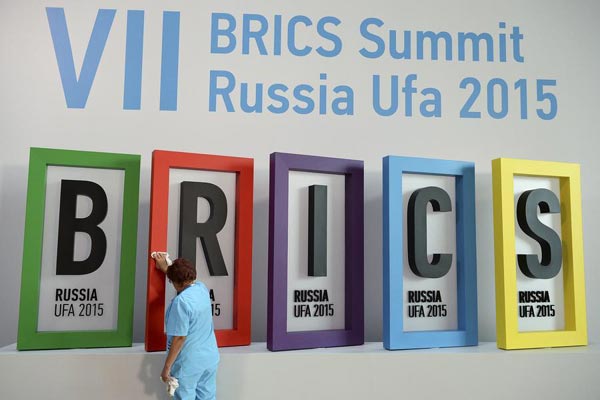Trip shows we'll have some challenges ahead
By Fu Jing (China Daily) Updated: 2015-07-10 07:49
 |
|
An employee cleans a board during the preparations for the BRICS summit in Ufa, Russia, July 7, 2015. [Photo/Agencies] |
The distance between Ufa, a major city in Russia, and the capital, Moscow, is less than 1,500 kilometers, but I have to wait at least six hours for a plane. It's not like in China, where Beijing is connected with every provincial capital by dozens of daily flights.
When I walk out of the Ufa airport into the chilly early morning on Thursday, I thought I could easily grab a taxi to my hotel, but I had to wait 40 minutes for a ride. There is no taxi at the tiny airport. I took the shuttle bus downtown with fellow journalists from Brazil and India.
It is a real bus, temporarily used for the BRICS and Shanghai Cooperation Organisation summits. Winding its way at a low speed, the bus took more than two hours to reach the hotel in suburban Ufa. Taking a shuttle bus takes time.
Later, getting into a cab to the media center, I see it is an old car. The seat is broken and dirty, resembling those I saw in Africa and faraway towns in poor parts of China. As the taxi driver makes a cellphone call, I notice the numbers on his Nokia device are indistinct after being dialed for so many years.
I am not complaining about a Russian city where I have just spent two days. As a Chinese journalist growing up in a poor, isolated village, I could easily accept any hardship.
Yet my examples and experience in Ufa provide the background for a message I would send to the heads of states who are attending the summits here.
It is clear that the Western-led global system has long offered unfair treatment to developing economies. That is the reason why the emerging economies of Brazil, Russia, India, China and South Africa (the BRICS countries) should sit down at the table to discuss ways to make the system more fair and ensure they have more say in decision-making.
It is also true that for years the world has not been a safe place. Violence, conflicts, wars, natural disasters, pandemic diseases and other threats have brought numerous dangers to humanity. Modern global institutions have not offered ample solutions. That is why the SCO countries should seek alternatives to deal with such challenges and make the world safer.
For their global agendas and a fairer international system, they have gathered in Ufa to discuss a fresh way forward. This is high on their schedule as the leaders meet through Friday.
My limited experience in Ufa leads me to urge the leaders to compare their domestic agendas and challenges as well. The people in Ufa deserve the same living standards as those living in Moscow. And the poor in China's mountains also have the right to live as prosperous a life as those in Beijing and Shanghai.
Nearly all of the BRICS countries and SCO members have faced the challenges of growing regional disparity, income and wealth gaps, and widespread shortfalls in public goods and infrastructure in many parts of their countries.
Some countries additionally lack efficient and clean modern governance and management institutions.
So my message is obvious: the BRICS and SCO should grow into open and exclusive multilateral and regional platforms, in which they learn from themselves in pursuit of domestic prosperity and equality.
Only then can they form solid foundations and achieve international fairness.




